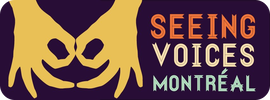Frequently Asked Questions
- I am interested in learning American Sign Language (ASL). Where can I take a course?
- We offer online ASL and specialized courses such as "Intro to ASL (with health care focus)" every season. Please click on "Courses" in the navigation bar to see more. If no classes are available for registration at the moment, please sign up on the waiting list and we will email you when registration opens.
- Is sign language universal?
- No. Sign language is not universal; just like spoken languages, it is very dependent on the associated region and culture. Across Canada, Deaf people associated with "anglophone" backgrounds tend to use American Sign Language (ASL), while Deaf people with "francophone" backgrounds tend to use "Langue des signes québécoise" (LSQ). You may meet Deaf Montrealers who are fluent in both ASL and LSQ. In other parts of Canada, Deaf people also use Maritime Sign Language and Indigenous Sign Languages.
- Should hearing people teach Sign Language?
- Most hearing people learn Sign Language later on in their lives and many are not fluent enough or qualified to be Sign Language teachers. According to the Canadian Association of the Deaf, only 20% of Deaf Canadians are fully employed; 42% are under-employed; and 38% are unemployed. It is seen as unethical for hearing people to take "paid ASL teaching jobs" that could be performed by a Deaf person. Hearing people can perform other jobs that require the ability to speak and hear. Jobs involving ASL that don't require the ability to speak and hear are ideal for Deaf people and should thus be filled by Deaf and not hearing people. This includes teaching sign language for babies that has become popular over the years.
- What is Deaf culture? Why is the "D" capitalized?
- The cultural-linguistic view of "Deafhood" focuses on recognizing Deaf people as minority cultural groups with their own natural sign languages. The capitalized "D" for Deaf signifies the right of Deaf people to have a collective space within society to develop and pass on their languages, traditions, and customs (much like being Canadian, American, and Italian...etc). Like other cultures, Deaf communities have their own histories, traditions, values, and social norms, which are passed down the generations. (pg xii, Signing Naturally Units 7-12, DawnSignPress 2014)
- Do all Deaf people sign (ie. use sign language)?
- Not all Deaf people sign. There are many kinds of Deaf people with diverse identity backgrounds, depending on their familial upbringing, education, and personal choice. Some have been raised orally Deaf, using speech and lip-reading as the main mode of communication, they may or may not know sign language. Some Deaf people only use sign language as their preferred mode of communication, they can be from all-Deaf families or hearing families. Some Deaf people are later deafened or hard-of-hearing. There are many alternative communication methods with various efficacy (ie. signing exact English (SEE), cued-speech...etc). It is important to recognize that there are many ways of Deaf communication and to ask what the Deaf person prefers.
- Can hearing actors play Deaf roles in theatre/film/television?
- You might have seen the trending hashtag #DeafTalent on social media. Deaf actors and talent have enjoyed the limelight in the entertainment industry recently (ie. DeafWest Theatre's rendition of Spring Awakening on Broadway, Nyle DiMarco in America's Next Top Model & Dancing with the Stars, Switched at Birth, and Tribes...etc), yet there are still many Deaf roles being played by hearing actors who are often unable to portray the Deaf community and Deaf experience honestly. See "cripping up". If Deaf actors are not hired for Deaf roles, when will they ever be cast? Deaf roles require authentic Deaf perspectives. For an insightful glance into the subject, please read: http://www.americantheatre.org/2015/10/20/deaf-talent-seen-and-heard/
- I would like to work with Deaf actors or American Sign Language in my play/performance/work. Where can I find the appropriate resources to learn more?
- The Deaf Artists and Theatres Toolkit (DATT) has been developed by Cahoots Theatre, and is a comprehensively detailed resource for those who are interested in working with Deaf artists and Sign Language. If you are looking for local Deaf artists, DASLs (Directors of Artistic Sign Language), or professionally trained English-ASL interpreters, please email [email protected].
Updated: (2022-10-13)
